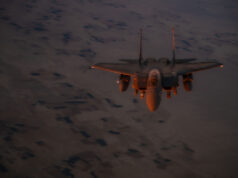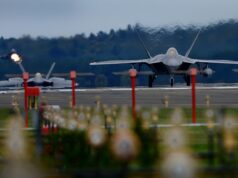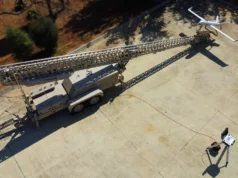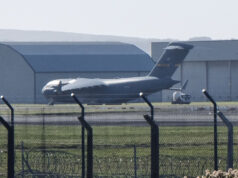British forces have been involved in supporting Israel after Iran launched missiles at the country.
Healey stated, “I completely condemn Iran’s attack against Israel. British forces have this evening played their part in attempts to prevent further escalation in the Middle East. I want to thank all British personnel involved in the operation for their courage and professionalism. The UK stands fully behind Israel’s right to defend its country and its people against threats.”
A statement from Defence Secretary @JohnHealey_MP following Iran’s attack against Israel tonight. pic.twitter.com/D3ESuHW4vk
— Ministry of Defence 🇬🇧 (@DefenceHQ) October 1, 2024
Prime Minister Keir Starmer affirmed the UK’s position during a hastily-arranged statement from 10 Downing Street after nearly 200 missiles targeted Israeli areas.
He said, “We stand with Israel and we recognise her right to self-defence in the face of this aggression. Iran must stop these attacks. Together with its proxies like Hezbollah, Iran has menaced the Middle East for far too long, chaos and destruction brought not just to Israel, but to the people they live amongst in Lebanon and beyond. Make no mistake, Britain stands full square against such violence. We support Israel’s reasonable demand for the security of its people.”
Former Defence Secretary Grant Shapps also spoke about the event.
Many people woke up this morning to news of overnight missile strikes launched by Iran against Israel, marking a serious escalation in the already tense situation in the region. Here’s what we know so far:
In the early hours of 1 October 2024, around 200 missiles were fired from various sites within Iran, targeting military and strategic locations across Israel. The missile strikes, carried out by the Islamic Revolutionary Guard Corps (IRGC), were reportedly in retaliation for the recent assassinations of key Iranian-backed figures, including Hezbollah leader Hassan Nasrallah and Hamas commander Ismail Haniyeh. Iran has codenamed this operation “True Promise 2.”
The Strikes
The missiles were launched with the intent to hit Israeli military infrastructure. According to Iranian state media, the strikes were a direct response to recent Israeli operations in Lebanon and the targeted killings of senior commanders. While Israel’s missile defence systems intercepted a large number of the incoming missiles, several fragments still caused damage on the ground. Among the casualties was a Palestinian civilian who was killed by falling debris, while two Israeli civilians and two Jordanians sustained injuries from shrapnel.
Israeli Response
In the wake of the strikes, Israeli Prime Minister Benjamin Netanyahu addressed the nation, stating that Iran had made a “grave mistake” and vowed that Israel would respond. The Israeli military confirmed that they had intercepted a significant portion of the missiles and that preparations were being made for potential retaliatory action.
The United States also quickly condemned the strikes, with the Pentagon confirming that U.S. naval forces in the region assisted Israel by launching missile interceptors. The U.S. National Security Advisor warned that Iran would face serious consequences for the attack, reaffirming America’s commitment to supporting Israel. Meanwhile, Jordan, which also came under threat, reported that its air defence systems successfully intercepted missiles and drones in its airspace.
Regional Impact
This attack marks a major escalation in the already tense situation between Iran and Israel. In recent months, hostilities have been rising, particularly after Israeli airstrikes targeted Hezbollah positions in Lebanon. The killing of Nasrallah, along with other key figures, has been seen as a significant blow to Iran’s influence in the region, and these missile strikes appear to be Iran’s response.
The situation has prompted Israel and Jordan to temporarily close their airspace, leading to disruptions in international flights. Airlines have been rerouting planes to avoid the region, and there is a palpable sense of uncertainty over what could come next.
International Reaction
Governments around the world have been quick to respond to the escalation. European Union officials have condemned the missile strikes and reiterated their commitment to Israeli security. In the United Kingdom, Prime Minister Keir Starmer called Iran’s actions a “reckless provocation,” while France’s President Emmanuel Macron reaffirmed his country’s support for regional stability, noting that French forces in the Middle East were prepared to respond to further threats.
Meanwhile, in Iran and parts of Gaza, crowds have taken to the streets in celebration, waving flags and holding portraits of the leaders who were killed. Iranian state media has praised the missile strikes as a major victory, while in Israel, people are bracing for potential retaliatory action.
What’s Next?
As the situation continues to develop, the possibility of further escalation remains high. Israel has indicated that a military response is likely, which could see renewed airstrikes targeting Iranian interests in the region. While Israel has previously conducted strikes against Iranian-backed forces in Syria and Lebanon, direct strikes on Iran itself could mark a dangerous new phase in this conflict.
For now, both sides appear to be preparing for what might come next, and the international community is watching closely. The risk of a broader conflict remains, and any further military actions could have far-reaching consequences, not just for Israel and Iran, but for the stability of the wider region.
As tensions simmer, there’s a sense of uncertainty about what the next few days might bring.














I am curious as to how an aircraft intercepts ballistic missiles.
I was wondering just the other day whether Meteor was capable of this- maybe it is.
After all, it’s mach 4.5 (same roughly as an Aster, which we now know can hit ballistic missiles) with an active radar seeker, and can take course updates mid-flight; even if the Eurofighter’s radar can’t track a ballistic missile (no idea either way), it could be guided onto the missile via an AWACS or even AEGIS destroyer before the Meteor’s seeker takes over. Not saying it definitely did, just saying it’s not out of the question.
I wouldn’t mind betting the most up to date Eurofighter radars probably can track ballistic missiles. Also most of our assets are networked so targetting data doesn’t necessarily have to come from the Meteor launch platform.
The RAF were not splashing Iranian ballistic missiles. They likely provided ISR support. In April the RAF were able to shoot down drones and cruise missiles as we had ample warning. The ballistic missiles took 12-14 minutes.
I don’t think they have, it states they were involved not that they hit anything. Could just be radar coverage.
my thoughts too, probably just involved in tracking missiles and giving Israel heads up.
Am not sure why the UK gov feels the need to advertise so strongly that we were involved in helping israel though.
Maybe its to send a message to other players, most likely reason imho.
Fair point, no idea. Just adds a target to the UK back, as groups like to strike out against the UK as proxy of US without the risk of what would happen if they hit out against the US.
I suspect it’s just the MOD/foreign office usually problem of wanting to look like they are still on the big boy table.
Didn’t they pick off some drones coming from Iran?
Not surprising to see zero comment on Netanyahu and his hardline government’s deliberate provoking of this expansion of the Gaza conflict into Lebanon. Hezbollah were keeping things very low key, as they have for a long time now- Israel stepped this up.
I am no fan of Hamas, Hezbollah, or Iran. I support Israel’s right to defend itself. But the British government should be capable of the subtlety of condemning two sets of bad actors. The Israeli government is deliberately escalating a crisis off the back of an horrific terrorist attack nearly a year ago, in an attempt to stay in power to avoid prosecution (Benny) and further their aims of expanding Israeli territory into Palestinian areas (the hardliners who prop him up). They are just as much responsible for destabilising the region as Iran is right now.
Apologies, rather more political than I normally am, but frustrated that we seem incapable of calling out bad behaviour in certain governments.
If there is any bad behavior is yours.
So you think 70000 persons unable to live in North Israel is low key?!
I don’t even go into the fact Heezbollah exists to destroy Israel.
Once again some people punish Israel for care for their civilians. Should Israelis start to live underground for your happiness?
My bad behaviour?
Israel levelled multiple apartment blocks in downtown Beirut with bunker busters to kill two people; if they identified them and their convoy (which they did) then they could have used a hellfire or a Spike with less collateral loss of life, but they didn’t; they chose to do it in a way that will increase tragedy and drive support towards Hezbollah for decades. Why? Because it suits the current Israeli government to do so.
I made it very clear in my post that I support Israel’s right to defend itself- but that shouldn’t come as a blank cheque in terms of their behaviour. I think they should be able to live in their homes, but I don’t think that settlers have a right to move into the West Bank and Gaza behind Israeli troops and take land that isn’t theirs. I think that Israelis should be able to live without fear of air raids, but I don’t think that gives Israel’s government carte blanche to prosecute a conflict against Hezbollah without the restrictions that we place upon our own troops. It would have been a lot easier to fight insurgents in Iraq and Afghanistan if we could just level city blocks without thought for those who’re living there- but we quite rightly didn’t.
I am not saying that Hezbollah are in the right, I am saying that the way Israel is prosecuting this war isn’t right either. We should be able to say both things, but apparently we are so polarised we’re not able to. That is a real worry.
The reports are that they were killed in a bunker built under those apartment blocks. If you look at the images of the blast site it’s pretty interesting to see just how well Hezbollah had hidden themselves away.
The craters go down 40/50 feet, you can see adjoining tunnels and the massive support pillars to hold the apartment block up. So no a Spike missile wouldn’t have done the trick.
I have no issue what so ever with your point of view, it’s freedom of speech but I’d strongly urge you to check multiple sources before forming an opinion (check out images from Al Jazeera, Times of India).
Apologies Rodney, maybe I wasn’t clear- I have seen those photos and from a technical perspective it’s amazing that we have weaponry that can do that. I fully agree a hellfire or spike wouldn’t have touched those tunnels.
My point was that the accounts state they (the Israelis) were following that convoy containing the target, saw the guy arrive at the location, and had enough time to get government authorisation and scramble F-15s with bunker busters to hit that target with sufficient confidence that he hadn’t already left.
To me, that says that they could have hit that convoy on the move with whatever smaller precision guided weapon they liked. Even if it caused some collateral casualties in the street, it pales into insignificance compared to the option taken.
I actually think that if I was able to track a notoriously difficult to locate high value target, I’d want to know where he was going ! That target is worth far more than just one convoy, it’s not a 3 level underground Lidl 🥴
Your are changing the subject:
You wrote this:
So your advice is for Israel government. to care less for their people – like Palestinians and Heezbollah – have 500 deaths and then Joe16 will finally allow them to attack.
Like i said you and many others promote the disregard of civilian life.
How am I changing the subject? Israeli actions in Gaza and Lebanon are linked. Which 500 deaths are you talking about? Israelis in the north have been evacuated, so they’re alive, I’m not proposing that Israelis be killed.
My point is that Israel has, in the last couple of weeks and particularly with those bunker strikes in Beirut, massively escalated the conflict in the north from where it was- because Netanyahu and his government expanded their war aims related to Hamas in the Gaza strip. Why did they do this? Because the conflict there was petering out and they needed things to remain hot so that the coalitions that keep them in power didn’t collapse. Why did they do that? Because Netanyahu is trying to avoid criminal prosecution, and the hardliners are using the conflict to expand illegal settlement and further displace non-Israelis.
Beforehand, the war aims were the removal of Hamas and some kind of very loose comments about what they’d do with Palestinians afterwards; justifiable, even if the settler groups were busy taking additional Palestinian land that had been abandoned due to the fighting with the IDF. Then, the addition of the line item: Return of displaced Israelis back to the north. All well and good, seems reasonable. How are they going to do that? historically, that border has died down after the fighting in Gaza has died down- so should return to normal on its own as the IDF achieves its war goals in Gaza. But instead they chose the “multiple 1,000 kg bombs into a crowded residential area” approach.
We have seen time and again how strikes that kill civilians drive the survivors into the ranks of extremists, this is human nature and one of the key lessons we got out of Afghanistan and Iraq. Israeli experience will know the same thing, yet they chose that over what could have been a more targeted strike to achieve the same war aim of killing Hezbollah commanders. You have to ask yourself why. And my answer to that is contained in my first paragraph of this response. It has nothing to do with wanting more Israelis to die; in my view, this action has guaranteed more Israelis will die down the road.
Joe. Appreciate your thoughts on this and i agree Benny has more than defence on his mind. However the Middle East is a f***ing powder keg at all times and we have to ask ourselves who we would rather be dealing with. A democratic western power that could, with this action, possibly bring another 10 years of relative (enforced) peace to the region. Or a bunch of Iranian backed jihadists with no end game on their minds other than the total destruction of an established nation state. Its pragmatic politics.
I don’t disagree with the view that the whole place is a mess- please don’t get me wrong.
But I don’t see why pragmatic politics means we can’t criticise bad behaviour on any side where we see it. I think it’s pragmatic to prevent/dissuade Israel from committing war crimes that compromise its position as a democratic western power. Both to try and reduce the tensions in the area, but also because it damages our own standing as a democratic western power.
@joe – Hezbollah has been sending rockets into Israel for 18 years and along with Hamas demands the destruction of Israel as a state. They ignore the fact that it was Islamic armies that invaded the land of Israel in 636CE – renamed Palestine by the Emperor Hadrian to try and wipe out memory of the Jews when he built a temple to Jupiter in place of the Jewish temple destroyed by Titus. The same Islamic armies then invaded all of North Africa and less than 80 years later invaded Spain, then France before meeting their match against Charles Martel outside Tours. Spain took some 700 years to evict the invaders without ever conceding a two-state solution, yet Spain now demands Israel accepts one. When Luftwaffe accidently bombed London in WW2 we sent bombers to target Berlin so we have no right to criticise Israel. Where are the complaints about the RFA in Sudan cleansing Darfur of its dark skinned inhabitants?
With regards to Darfur, am I obliged to list every single state or non-state actor that I condemn before I criticise Israel? It’ll be a really long post…
I don’t contest any of the history you list there, it is the way of the world and the history of mankind. Israel is not the only country to have ceased to exist due to conquest, temporarily or permanently.
I would point out, however, that post WW2 the western allies (Britain fairly key among them) set about instituting what’s become known as ‘the rules-based international order’, largely enforced by the US but also via ourselves. War crimes, justifications for war, and other items were clearly defined, prohibitions enforced upon ourselves, allies, and expected of others. Last time I checked, we were still at the very least pretending that we subscribed to this, sought to enforce this, and expected it of others.
I do not think that Hezbollah and Iran comply with this, and I condemn them for it. For the record, I don’t think the RFA do in Sudan either and condemn them too. But I’m not sure why I can’t therefore also condemn the Israeli government for also pursuing objectives via means that contravenes the rules we’ve put in place either. I’m just looking for consistency.
If Hezbollah deliberately put their command bunker under a civilian block of flats it ceases to be a protected target. That’s protocol 1 of the Geneva convention which defines using Civilians as a Human Shield as a war crime.
The evidence is in the pictures and that they killed their intended target.
Hi Rodney, leaving aside the questions of whether Israel can be in a state of war with a non-state actor like Hezbollah (I think they can, although a lot of the pro-Palestine and Al Jazeira crowd would state otherwise), I would agree with you that what Hezbollah did constituted a war crime under protocol 1.
However, articles 47 states: “‘ Article 47 — General protection of civilian objects ‘
1. Attacks shall be strictly limited to military objectives, namely, to those objectives which are, by their nature, purpose or use, recognized to be of military interest and whose total or partial destruction, in the circumstances ruling at the time, offers a distinct and substantial military advantage.
2. Consequently, objects designed for civilian use, such as houses, dwellings, installations and means of transport, and all objects which are not military objectives, shall not be made the object of attack, except if they are used mainly in support of the military effort.”
And article 52: 1. Civilian objects shall not be the object of attack or of reprisals. Civilian objects are all objects which are not military objectives as defined in paragraph 2.
2. Attacks shall be limited strictly to military objectives. In so far as objects are concerned, military objectives are limited to those objects which by their nature, location, purpose or use make an effective contribution to military action and whose total or partial destruction, capture or neutralization, in the circumstances ruling at the time, offers a definite military advantage.
3. In case of doubt whether an object which is normally dedicated to civilian purposes, such as a place of worship, a house or other dwelling or a school, is being used to make an effective contribution to military action, it shall be presumed not to be so used.
This puts the onus on Israel to minimise damage and destruction to Civilian Objects and the Protected Persons therein, or they have committed their own war crime. As I noted in my previous response to you, there were other options that they could have followed that would have caused less collateral damage.
Again, this is not about only holding Israel to account, I am very mindful of Hezbollah’s war crimes. But last time I checked, it is entirely possible for both sides of a conflict to do bad things- and we should criticise both for them.
you raise a very good point. The issue is you will see is this consistency getting more and more lost as the world moves ever closer to all out global war.
Very true. bleak, but true…!
Iran has been provoking this war for decades, arming, Hamas, Hezzbollah, and the Houthis, with the single intent to destroy Israel, they have made this situation unavoidable.
The real hardliners are the Hamas and Hezzbollah supporters, they do not want a two-state solution they want to exterminate or drive out all Jewish people from the middle-east, and for Israel not to exist at all.
This conflict is not about sharing land, it is about religious/cultural supremacy and there will be wars until that attitude changes.
Respectfully (as Daniele reminded me I should be!), I don’t see why we can’t say that there are hardliners on both sides. Take a look at the current makeup of the Israeli government, it is not the friendly, liberal western bunch that is presented when we watch Eurovision or see the adverts for visiting Tel Aviv.
Absolutely, couldn’t agree more about Iran’s toxic influence in the region. But take a look at the history of the settler movement, going back longer than the Islamic Republic of Iran has been a thing, and it’s also pretty unappetising. Am I equating all Israeli politics with the settler movement? No. I affirm Israel’s right to exist and defend itself. Has Iran historically been more destabilising to the region? Probably.
I would agree that religion and culture plays a part- but that falls on both sides. Land is very heavily tied up in the religious justification for the Israeli hardliners, so unfortunately it does play its part.
Ultimately, I think we should be able to call both sides out for the bad behaviour they’re exhibiting. That’s all.
It makes no difference saying there are hardliners on both sides,
If Israel softened and gave land for peace to Hamas and Hezzbollah it would not placate them in the least.
Israel would make peace if they could. but it is made impossible by the genocidal intentions of Hamas, Hezbollah and Iran, they will simply not accept the presence of Jewish people existing in a land they see as belonging to Arabic /Muslim people, they refuse to compromise on that point so war goes on forever.
It makes all the difference to say there are hardliners on both sides, because defending Israel and saying they’re whiter than white in everything they do makes us liars.
I repeat that I support Israel’s right to exist and to defend itself. And yes, it absolutely makes things verging on impossible given the intent of Hamas, Hezbollah, and Iran. But let’s not pretend that the actions of the settler movement over the last 70+ years has had zero impact on the state of play today.
We make ourselves look stupid at best and complicit at worst if we don’t acknowledge that.
Hi Joe.
Much more political.
No issues from me. Everyone has a right to state their beliefs, whether others agree with them or not.
Free speech.
Fair play mate. 👍
Thanks mate- fully agree, free speech is really important and I’m not a fan of how even in this country it seems to be being curtailed.
Things are easy to get heated online, but this is the venue we have and I try not to go over into the personal, because it shouldn’t be about that. I think it’s important to remember that one person’s view is going to be different from one’s own and that’s both OK and no bar to getting along with that person and agreeing on a whole host of other issues. But I sometimes forget..!
‘Hezbollah were keeping things very low key,’
they have only fired 8000 rockets/missiles into Israel since October………
Fair point well made, low-key is very much relative. But it has most certainly been tit for tat over that time, with Israeli strikes on Hezbollah occurring also.
Once again, I am not withholding criticism of Hezbollah and Iran, or Hamas.
But I really don’t understand why I can’t criticise Israel for the way that their government is capitalising on these conflicts to avoid criminal prosecution and further a hard line cause that is in contravention of international law.
Yip! – and let’s not forget that they declared war on Israel on 8th Oct.
What nonsense … if Hezbollah, Hamas or any of the Palestinian extremist groups ever made it into Israel, they would kill every Jew in the country. … of course Israel should seek to destroy Hezbollah in the context of the regional war that Iran and its proxies initiated last year.
What is nonsense?
My statement was that Israel’s behaviour should be open to criticism when they contravene the standards to which we hold our own military and expect from our allies. Equally, we should also be continuing our criticism of Hezbollah, Iran et al.
Why are so many on here insisting that we can’t do both?
Look, you just need to give your head a shake. The Iran-Hezbollah-Hamas axis is the modern equivilent of Nazi Germany. The murder campaign that this axis would embark upon were they ever to get into Israel would be on par with that undertaken by the Nazis in World War II. … the idea that, after being attacked last year, Israel can just engage in “business as usual” with this axis or that “both sides deserve criticism” is nonsensical.
How did Britain fight the axis powers in World War II after they initiated the war? It fought those powers ruthlessly but with clear-headed determination. Well now Israel is doing the same. War is awful and terrible, and civilian casualties are unfortunately inevitable, but that is just the way it is.
I think comparing any modern warfare to WW2 in terms of strikes on civilians is a misleading argument.
It was impossible with the technology available in the 1940s to avoid bombs falling on civilians areas in attacking e.g. a railway station. The accuracy statistics from Bomber Command make that clear.
The onus is on the person dropping the bombs to limit damage to military targets to the best of their ability. With modern laser guided bombs there is no reason for one to land on an entirely civilian target unintentionally.
The difficulty comes where your military opponent is deliberately hiding among civilians, as is seen here. The letter of the law seems to be that because attacking the soldiers is a legitimate target, it’s allowed, but that doesn’t make it right.
Any modern military ought really to be aiming for zero civilian casualties. Joe is right that Israeli personnel and members of the chain of command (but not Israel itself) have almost certainly committed war crimes during this conflict and the actions of Hamas and Hezbollah do not absolve them of the duty to follow and uphold the rules of war.
No argument with much of what you are saying in principle.
But even with laser guided bombs, detonating pagers or whatever, there is always going to be collatoral damage. As in WWII, it is impossible to completely exclude civilian casualties. As the intensity of the war increases, as ground troops have to move into civilian areas, the proportion of those civilian casualties will inevitably rise.
No military can aim for zero civilian casualties in such scenarios – whether it is World War II or the current Middle East conflict. That is just totally unrealistic. You don’t shrink from the primary imperative of acheiving the objective. In that sense, modern warfare is no different than what prevailed in WWII.
As for “war crimes” that very much depends on the specific case and on who judges those specifics. War itself is a crime and much of what happens in the context of a crime becomes just another terrible detail.
I phrased my reply badly, I think.
I don’t expect miltaries to actually achieve zero civilian casualties: as you said, that is always unrealistic.
Instead that should always be the aspiration; how can we achieve the mission with a minimum of casualties? That needs to take place over a strategic scale- can we fight the battle away from cities? and a tactical one – how do we clear the house without shooting the owners?
In war, as with politics, courtesy and attention to duty is in short supply.
Maybe we should go back to the 1700s with war as a sort of extension of sport, with the field agreed in advance and polite exchanges before the shooting.
I think we forget just how controversial the levelling of German cities was, even at the time. Sailor Boy rightly points out that they were operating at the limits of the available technology. If the RAF and USAAF had precision bombs capable of levelling the factories and leaving the houses (largely) standing, they would have done.
I have pointed out a couple of times that Israel very clearly had a line on their targets from well before they entered this bunker under the residential tower blocks. They could have taken them out with a hellfire or similar with far less collateral loss of life (I also am a realist and realise that zero collateral is unrealistic). But they didn’t, they dropped multiple 1,000 kg bombs on blocks of flats instead. They had the choice that the WW2 RAF and USAAF didn’t have, and they went with the bloodier option.
I’m not questioning what Hezbollah would do to Israel if they had the opportunity, but why that means that Israel can’t be criticised is beyond me. There is ample evidence that strikes like this drive people towards the ranks of Hamas and Hezbollah and all the other similar organisations, yet Israel thought they’d maximise the potential for this rather than minimise it. It’s self defeating, if nothing else.
Good. Look after our allies
why? They didnt look out for us that much with Ukraine. I believe at the time they tried to play both sides.
As i have been warning, the western military configuration needs to change significantly.
30 years of development and even now not even finished and trillions of money for an F-35 is impossible to sustain when missiles and drones will reach several thousands in coming decade and will keep evolving.
The place to watch is jordan, this is now the second time jordan has intercepted Iran missiles going over its airspace. Iran has been using pretty robust political warfare to destabilise jordan for a while now ( up to an including training, infiltrating in and arming insurgents).
Starmer was reported yesterday as having phone conversation with Abdullah II, king of Jordan. Strong family links to UK; Abdullah’s mother was British. He advocates a moderate interpretation of Islam. One look at the map tells you Jordanian airspace is a good place to intercept Iranian drones headed for Israel.
I very much doubt that UK forces were involved in shooting down ballistic missiles. The MOD has not stated what exactly UK forces did but it was most likely ISR support.
So what exactly did we do? The only thing I’ve read is that the government had a COBRA meeting and a press conference.
The article says that British forces intercepted several of these Iranian missiles. That’s more than a meeting.
its very interesting as if confirmed it would clearly shows that the RAF typhoons have the capability to intercept short and medium range ballistic missiles.
Yes, this had me scratching my head as I thought they only had the capability against “look down shoot down” types, so Cruise Missiles.
I’m sorry. I must have missd it. Where does it say that?
We were there.
No one knew in advance that Iran would only send ballistic missiles and not drones or cruise missiles. Same with HMS Diamond, she may not have long range interceptors but she can track targets for others to shoot.
Where were we Bob?
HMS Diamond would have a hard job tracking anything in the Middle East, she is docked in Portsmouth, Duncan is the Ship on station.
The two are looking more similar by the day unfortunately
Sounds like no intercepts where achieved by the UK forces, as the goverment was quick to confirm they were last time but kept quiet this
My question would be.
How many of the objects seen inbound on the News last night were effective warheads having survived re-entry?
It struck me that many were broken ‘bits’ likely after earlier and higher unseen intercepts. A testament to the defence systems involved, or indicative of the poor quality of the original projectiles.
How many of the craters represented the result of an operational warhead?
We’ll never get the answer from the press unfortunately, nor the protagonists.
I think escalation was inevitable as Iran and its proxy terrorists were humiliated. The Islamo/fascist mindset is macho and extreme. Shame Israel is doing what the western collective should have done years ago. Iran needs taking out of the equation totally. Then hopefully a counter revolution to displace the current theocracy for good.
Joe 16, behind your right to free speech!
Jonathan. you always have my respect, even if we might disagree.
That it takes so much resource to produce a battery brings into question whether they are a good idea however, for anyone living in London, please travel to the North. The Midlands, the North and Scotland need high speed rail and modal shift away from fossil fuel burning cars.
Where am I going? We need to shut down the petro-dollars and switch off the lights and walk away from the Middle East – let them fight it out without newspaper coverage and then pick up the pieces afterwards – but, it needs to end and one way is less reliance on plastics and the oil that produces them and a complete move away from fossil fuelled cars.
Denying oil producing countries both money and more importantly, political influence might see the role of Israel reduced to such a low level of importance that Israel might actually begin to think that treating all human life as importantly as there own chosen few seemed a sensible choice or they face utter destruction.
The UK and EU are making that journey, the US is yet to begin, but when it does, Israel either changes or it will be changed,
Ban sales of some equipment and yet stand with them at the same time.
😎
time to take out those nuke sites in Iran. clearly Iranian regime would not hesitate to use them. you can disagree, but i dont think it’s a risk worth taking.